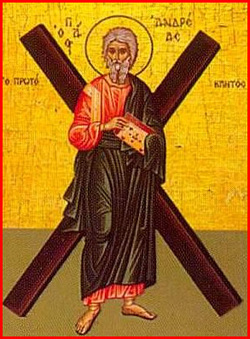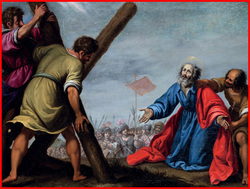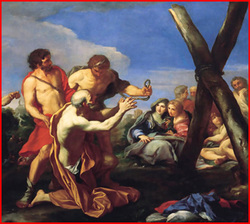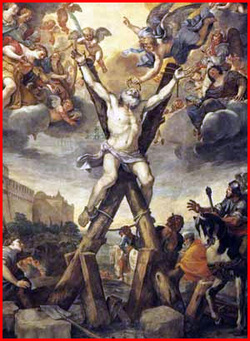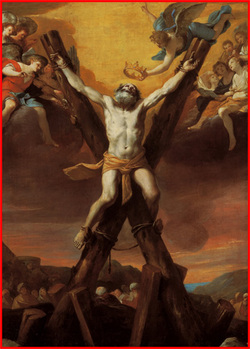| Devotion to Our Lady |
|
- Homepage
-
Daily Thoughts
- 2023 October Daily Thoughts
- Daily Thoughts Lent 2020
- Daily Thoughts for Advent 2019
- Daily Thoughts for October 2019
- Daily Thoughts for September 2019
- Daily Thoughts for August 2019
- Daily Thoughts for July
- Daily Thoughts for June
- Daily Thoughts for Easter 2019
- Daily Thoughts for Lent 2019
- Daily Thoughts for Christmas
- Daily Thoughts Easter 2022
- Sacred Heart
- Holy Ghost
-
Spiritual Life
- Holy Mass Explained
- First Friday Devotions
- First Saturday Devotions
- The Mercy of God
- Vocations
- The Path Everyone Must Walk >
- Gift of Failure
- Halloween or Hell-O-Ween?
- Ignatian Spiritual Exercises >
- Meditation is Soul-Saving
- Spiritual Communion
- Miraculous Medal
- Enrollment in Miraculous Medal
- St. Benedict Medal
- Holy Water
- Advice on Prayer
- Your Daily Mary
-
Prayers
- September Devotions
- Seven Sorrows of Our Lady
-
Novenas
>
- NV-Help of Christians
- NV-Nativity of Our Lady
- NV-Seven Sorrows
- NV- Sorrowful Heart
- NV-Pope St Pius X
- NV-La Salette
- NV-St Michael Archangel
- NV-Immaculate Heart
- NV-Assumption
- NV-Novena for Fathers
- NV-Novena for Your Mother
- NV-St Raphael Archangel
- NV-Souls in Purgatory
- NV-All Saints Day
- NV-Christ the King
- NV-Divine Motherhood
- NV-Guardian Angels
- NV-Rosary
- NV-Mirac Med
- NV- Imm Conc
- NV - Guadalupe
- NV - Nativity of Jesus
- NV-Epiphany
- NV-OL Good Success
- NV-Lourdes
- NV-St Patrick
- NV-St Joseph
- NV-Annunciation
- NV-St Louis de Montfort
- NV-OL Good Counsel
- NV-Last Supper
- NV-Passion
- NV-Pentecost
- NV-Ascension
- NV-Sacred Heart
- NV-Sacred Heart & Perpetual Help
- NV-Corpus Christi
- NV-OL of Perpetual Help
- NV-Queenship BVM
- NV-OL of Mount Carmel
- NV-St Mary Magdalen
- NV- Im Hrt
- August Devotions to IHM
- Immaculate Heart of Mary
- Litany of Dependence
- Prayers to St Mary Magdalen
- Prayers in Times of Sickness Disease & Danger
- Holy Souls in Purgatory
- Meditations on the Litany of Our Lady
- Special Feast Days
- Prayers to Mary (Mon-Sun)
- Litanies to Our Lady >
- Various & Special Needs
- Our Lady of the Rosary
- Our Lady of Mt. Carmel
- Our Lady of Perpetual Help
- Our Lady of Guadalupe
- Other titles of Our Lady
-
Rosary
- Downloads
- Consecration
- Easter Season
-
Holy Week
- Last Seven Words of Jesus >
- Characters of Passion >
- The Last Days of Christ
- Before Palm Sunday
- Palm Sunday
- Monday in Holy Week
- Tuesday in Holy Week
- Wednesday in Holy Week
- Holy Thursday (Last Supper)
- Holy Thursday (Agony & Arrest)
- Night Vigil with Christ
- Good Friday (Pilate & Herod)
- Good Friday (Way of Cross & Crucifixion)
- Saturday in Holy Week
-
Lent
- Ideas for Lent
- Daily Lenten Planner
- Daily Lenten Liturgy
- From Cold to Hot
- Lent with Aquinas
- Lent with Dom Gueranger
- Virtues for Lent
- History of Penance
- How Expensive is Sin?
- Confession of Sins
- Letter to Friends of the Cross
- Sermons for Lent
- Stations of the Cross >
- Lenten Prayers
- 7 Penitential Psalms
- Lenten Psalms SUN
- Lenten Psalms MON
- Lenten Psalms TUE
- Lenten Psalms WED
- Lenten Psalms THU
- Lenten Psalms FRI
- Lenten Psalms SAT
- Lenten Laughs
- Septuagesima
-
Christmas
- Epiphany Explained
- Suggestions for Christmas
- Food For Thought
- Christmas with Aquinas
- Christmas with Dom Gueranger
- Christmas Prayers
- Candles & Candlemas
- Christmas Sermons
- Christmas Prayers SUN
- Christmas Prayers MON
- Christmas Prayers TUE
- Christmas Prayers WED
- Christmas Prayers THU
- Christmas Prayers FRI
- Christmas Prayers SAT
- Twelve Days of Christmas >
-
Advent Journey
- Purgatory
- Christ the King
- Legion of Mary
- Scapular
-
Saints
-
Martyrs for the Faith
>
- Your Daily Martyr >
- All 365 Days of Martyrs
- Cristeros
- St Valentine & Valentine's Day
- Martyrs--Thomas Becket
- Martyrs--John the Apostle
- Holy Machabees
- Age of Martyrdom
- Carmelites of Compiegne
- Martyrs--Peter & Paul
- Martyrs--John the Baptist
- Martyrs--Andrew
- Martyrs--James the Great
- Martyrs--North American
- Martyrs--Seven Holy Sleepers
- Martyrs--Afra
- School of Martyrdom
- Martyrs--Christina
- Desert Saints >
- Saints for Sinners >
- Saints of Mary >
- History of All Saints Day
-
Martyrs for the Faith
>
- Precious Blood
- Synod 2023
-
Catechism
- Catechism Lesson 1
- Catechism Lesson 2
- Catechism Lesson 3
- Catechism Lesson 4
- Catechism Lesson 5
- Catechism Lesson 6
- Catechism Lesson 7
- Catechism Lesson 8
- Catechism Lesson 9
- Catechism Lesson 10
- Catechism Lesson 11
- Catechism Lesson 12
- Catechism Lesson 13
- Catechism Lesson 14
- Catechism Lesson 15
- Catechism Lesson 16
- Catechism Lesson 17
- Catechism Lesson 18
- Catechism Lesson 19
- Catechism Lesson 20
- Catechism Lesson 21
- Catechism Lesson 22
- Bible Study
-
Calendar
- Miracles
- Apparitions
- Shrines
- Prophecies
- Angels Homepage
- Hell
-
Church Crisis
- Conspiracy Theories
- Amazon Synod 2019 >
- Liberalism & Modernism
- Modernism--Encyclical Pascendi
- Modernism & Children
- Modernism--Documents
- The Francis Pages
- Church Enemies on Francis
- Francis Quotes
- Amoris Laetitia Critique
- Danger of Ignorance (Pius X)
- Restore all In Christ (Pius X)
- Catholic Action (Pius X)
- Another TITANIC Disaster?
- The "Errors of Russia"
- CRISIS PRAYERS
- Election Novena 2024
- The Anger Room
- War Zone
- Life of Mary
- Spiritual Gym
- Stupidity
- Coronavirus and Catholicism
- History & Facts
- Books
- Catholic Family
- Children
- Daily Quiz
-
Novena Church & Pope
- Day 01 Church-Pope Novena
- Day 02 Church-Pope Novena
- Day 03 Church-Pope Novena
- Day 04 Church-Pope Novena
- Day 05 Church-Pope Novena
- Day 06 Church-Pope Novena
- Day 07 Church-Pope Novena
- Day 08 Church-Pope Novena
- Day 09 Church-Pope Novena
- Day 10 Church-Pope Novena
- Day 11 Church-Pope Novena
- Day 12 Church-Pope Novena
- Day 13 Church-Pope Novena
- Day 14 Church-Pope Novena
- Day 15 Church-Pope Novena
- Day 16 Church-Pope Novena
- Day 17 Church-Pope Novena
- Day 18 Church-Pope Novena
- Day 19 Church-Pope Novena
- Day 20 Church-Pope Novena
- Day 21 Church-Pope Novena
- Day 22 Church-Pope Novena
- Day 23 Church-Pope Novena
- Day 24 Church-Pope Novena
- Day 25 Church-Pope Novena
- Day 26 Church-Pope Novena
- Day 27 Church-Pope Novena
- Day 28 Church-Pope Novena
- Day 29 Church-Pope Novena
- Day 30 Church-Pope Novena
- Day 31 Church-Pope Novena
- Day 32 Church-Pope Novena
- Day 33 Church-Pope Novena
- Day 34 Church-Pope Novena
- Day 35 Church-Pope Novena
- Day 36 Church-Pope Novena
- Day 37 Church-Pope Novena
- Day 38 Church-Pope Novena
- Day 39 Church-Pope Novena
- Day 40 Church-Pope Novena
- Day 41 Church-Pope Novena
- Day 42 Church-Pope Novena
- Day 43 Church-Pope Novena
- Day 44 Church-Pope Novena
- Day 45 Church-Pope Novena
- Day 46 Church-Pope Novena
- Day 47 Church-Pope Novena
- Day 48 Church-Pope Novena
- Day 49 Church-Pope Novena
- Day 50 Church-Pope Novena
- Day 51 Church-Pope Novena
- Day 52 Church-Pope Novena
- Day 53 Church-Pope Novena
- Day 54 Church-Pope Novena
- Penance Novena
- Daily WeAtheR Forecast
CLICK ON THE NAME OF THE SAINT YOU WISH TO VIEW
(not all links are activated at this time)
THE ROMAN MARTYROLOGY FOR EACH MONTH OF THE YEAR
| January | February | March | April | May | June | July | August | September | October | November | December | All 365 Days on One Page |
MARTYRED SAINTS
| Your Daily Martyr | The Age of Martyrdom (20th & 21st centuries) | The School of Martyrdom | St. Peter the Apostle | St. Paul of Tarsus | St. James the Great |
| St. Andrew | St. John the Baptist | The North American Martyrs | St. Christina | St. Afra | The Seven Holy Sleepers | The Cristeros of Mexico |
SAINTS OF MARY
| St. Louis-Marie de Montfort | St. Dominic | St. John Eudes | St. Maximilian Kolbe | St. Bernard | St. Alphonsus Liguori | St. Ephrem |
| St. Catherine Laboure | St. Bernadette | St. Bridget | St. Catherine of Siena | Pope St. Pius X |
DESERT SAINTS
| Saints of the Desert | St. Paul the Hermit | St. Anthony of Egypt | Desert Father Wisdom |
SAINTS FOR SINNERS
| St. Paul of Tarsus | St. Augustine | St. Mary Magdalen | Dismas the Good Thief |
(not all links are activated at this time)
THE ROMAN MARTYROLOGY FOR EACH MONTH OF THE YEAR
| January | February | March | April | May | June | July | August | September | October | November | December | All 365 Days on One Page |
MARTYRED SAINTS
| Your Daily Martyr | The Age of Martyrdom (20th & 21st centuries) | The School of Martyrdom | St. Peter the Apostle | St. Paul of Tarsus | St. James the Great |
| St. Andrew | St. John the Baptist | The North American Martyrs | St. Christina | St. Afra | The Seven Holy Sleepers | The Cristeros of Mexico |
SAINTS OF MARY
| St. Louis-Marie de Montfort | St. Dominic | St. John Eudes | St. Maximilian Kolbe | St. Bernard | St. Alphonsus Liguori | St. Ephrem |
| St. Catherine Laboure | St. Bernadette | St. Bridget | St. Catherine of Siena | Pope St. Pius X |
DESERT SAINTS
| Saints of the Desert | St. Paul the Hermit | St. Anthony of Egypt | Desert Father Wisdom |
SAINTS FOR SINNERS
| St. Paul of Tarsus | St. Augustine | St. Mary Magdalen | Dismas the Good Thief |
THE MARTYRDOM OF ST. ANDREW THE APOSTLE
|
Tradition places the martyrdom of St. Andrew the Apostle on November 30th
, but the year is uncertain, various authors differ, placing it anywhere
between the years 60 and 69 AD (but, nevertheless, during the persecution of
Nero). St. Andrew is said to have been martyred by crucifixion at the city of Patros
(Patræ) in Achaea, on the northern coast of present day Greece. Before his death, the fame of St. Andrew the
Apostle, had spread throughout all the surrounding countries and many believed
in the Lord because of Andrew’s preaching.
Fisher of Men It has been said that the Apostle Andrew's father's name was Jona and his mother's name, Joanna. Like their father, Andrew and Peter were also fishermen on the Sea of Galilee. In fact, the Apostles Andrew, Peter, James and John were all partners in a fishing business prior to being called by Jesus to follow Him. St. Andrew was the first of the Apostles to follow Jesus and just as St. John the Baptist introduced Jesus to the nation of Israel, so St. Andrew is noted for having introduced Jesus to individuals. The Apostle, St. Peter, became the fisher of men en masse whereas Andrew was a fisher for individuals. Widespread Apostolate In his later ministry, it is believed that St. Andrew went to the foothills of the Caucasus Mountains (present day Georgia in Russia). While there, he preached to the Scythians as far as the Caspian Sea. He also went to Byzantium, which is present day Istanbul, in Turkey, and from there, to Greece. On his journeys the First-Called Apostle endured many sufferings and torments from pagans: they cast him out of their cities and they beat him. In Sinope they pelted him with stones, but remaining unharmed, the persistent disciple of Christ continued to preach to people about the Savior. Through the prayers of the Apostle, the Lord worked miracles. By the labors of the holy Apostle Andrew, Christian Churches were established, for which he provided bishops and clergy. The final city to which the Apostle came was the city of Patros, where he was destined to suffer martyrdom. City of Martyrdom The Lord worked many miracles through His disciple in the city of Patros, and Andrew won many over to the Lord. The infirm were made whole, and the blind received their sight. The miracles accomplished by the Apostle and his fiery speech enlightened almost all the citizens of the city of Patros with the true Faith. Among the new converts were the brother and wife of the governor Aegeas. Through the prayers of the Apostle, the illustrious citizen Sosios recovered from serious illness. Andrew had also healed Maximilla, wife of Aegeas, the governor of Patros, and his brother Stratokles. This angered both the pagan priests and the proconsul, Aegeas. Few pagans remained at Patros, but among them was the governor of the city, Aegeas. The pagan priests and Aegeas, fearful of his increasing influence, did not cease looking for him, in order to kill him. Pagan Stubbornness The Apostle Andrew repeatedly turned to the governor, Aegeas, with the words of the Gospel. But even the miracles of the Apostle did not convince Aegeas. The holy Apostle with love and humility appealed to his soul, striving to reveal to him the Christian mystery of life eternal, through the wonderworking power of the Holy Cross of the Lord. The angry Aegeas gave orders to crucify the Apostle. The pagan thought he would undo St. Andrew’s preaching if he were to put him to death on the cross. The soldiers were ordered to arrest Andrew, who was then bound and severely beaten. They then dragged him around the city naked, and then cast him into prison, so that they might crucify him the following day. Their custom was to stone those who were to be killed by crucifixion. Eve of Execution The Apostle spent his night praying to God. The Lord Christ appeared to him and strengthened him saying, "Do not fear or worry for the time of your departure from this world is near." He gave him peace and disappeared. St. Andrew's soul rejoiced for what he saw. This is a consolation for us, for it shows Andrew, like Our Lord in His agony in Gethsemane, was far from having peace of soul. As the angel strengthened Our Lord that night, so did Our Lord strengthen Andrew, and so will all martyrs be strengthened by God when the appointed time arrives. Your Last Chance On morning of the next day, the proconsul Aegeas, who was to judge Andrew, at first adopted a kindlier tone, hoping that Andrew has changed his mind during the night, and twice offering Andrew his friendship, promising Andrew a happy life, if Andrew would only give up his foolish beliefs and lead back his recent Achaian converts to the worship of the gods, who are poised to wreak vengeance if Andrew refuses. This finally provokes an angry response from Andrew, who condemned the proconsul as a "Son of death, and chaff made ready for eternal burnings." Andrew then defiantly commands the judge do his worst, insisting that he (Andrew) will be more pleasing to God the more he suffers. Andrew's anger is apparently provoked by the judge's wheedling offer of earthly comforts, rather than by the threat of torture or the vengeance of the gods. Heaven's Gateway After being whipped severely by seven soldiers, Andrew was tied to the cross with cords to prolong his agony. Early texts, such as the Acts of Andrew, known to Gregory of Tours (died 594), describe Andrew as being bound, not nailed, to a Latin cross of the kind on which Jesus is said to have been crucified; yet a tradition developed that Andrew had been crucified on a cross of the form called Crux decussata (X-shaped cross), now commonly known as a “Saint Andrew’s Cross” — supposedly at his own request, as he deemed himself unworthy to be crucified on the same type of cross as Jesus had been. St. Andrew’s followers reported that when he was led toward the cross, he said, “I have long desired and expected this happy hour.” It is said that the crowds tried to rescue Andrew and take him down from the cross, but were rebuked by the Saint and exhorted to emulate his desire to suffer in patience like Jesus before him. Towards the end of his agony, the Apostle prayed to God and an extraordinary light encompassed him. This brilliant illumination lasted for half an hour, and when it disappeared, the Apostle gave up his holy soul to God. Records Say... In the church of St. Andrew in Patros, Greece, there is a book written in Greek which sheds light on his martyrdom. The following is written: "Aegeas, who was the governor of Patros, became enraged at Andrew for his preaching and ordered him to stand before the tribunal in his attempt to do away with the Christian Faith. When Andrew resisted the tribunal, the governor ordered him crucified. Andrew remained tied to the cross with thick tight ropes for three days and his last words were: ‘Accept me, O Christ Jesus, whom I saw, whom I love, and in whom I am; accept my spirit in peace in your eternal realm.’" An ancient writer also speaks of the Apostle's martyrdom as such: "Andrew hung upon the cross three whole days, suffering dreadful pain but continuing constantly to tell the people around him of the love of Jesus Christ. The people, as they listened to him, began to believe his words and asked the governor to let him be taken down from the cross. Not liking to refuse them, he at last ordered the ropes to be cut, but when the last rope was severed, the body of the Apostle fell to the ground quite dead." It is believed that Andrew died on the last day of November, the year being anywhere between 60 and 69 AD. |
Web Hosting by Just Host

